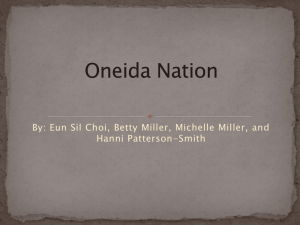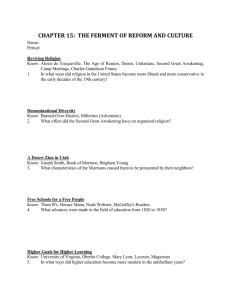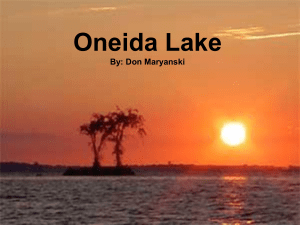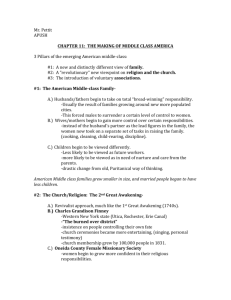Oneida Tribe
advertisement
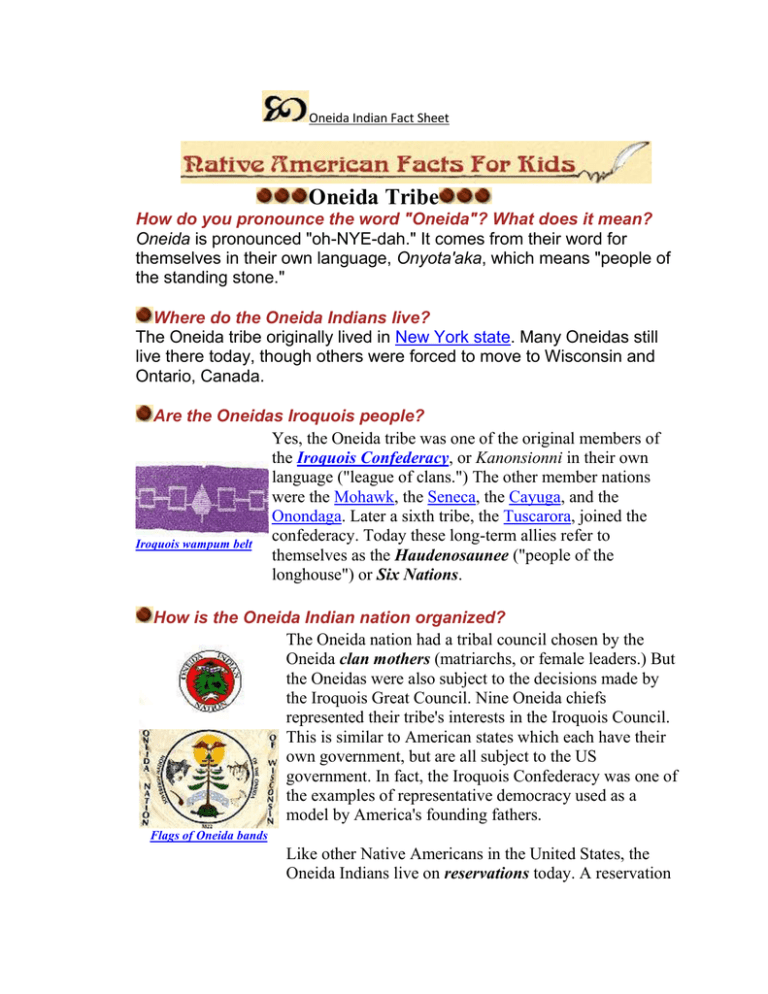
Oneida Indian Fact Sheet Oneida Tribe How do you pronounce the word "Oneida"? What does it mean? Oneida is pronounced "oh-NYE-dah." It comes from their word for themselves in their own language, Onyota'aka, which means "people of the standing stone." Where do the Oneida Indians live? The Oneida tribe originally lived in New York state. Many Oneidas still live there today, though others were forced to move to Wisconsin and Ontario, Canada. Are the Oneidas Iroquois people? Yes, the Oneida tribe was one of the original members of the Iroquois Confederacy, or Kanonsionni in their own language ("league of clans.") The other member nations were the Mohawk, the Seneca, the Cayuga, and the Onondaga. Later a sixth tribe, the Tuscarora, joined the confederacy. Today these long-term allies refer to Iroquois wampum belt themselves as the Haudenosaunee ("people of the longhouse") or Six Nations. How is the Oneida Indian nation organized? The Oneida nation had a tribal council chosen by the Oneida clan mothers (matriarchs, or female leaders.) But the Oneidas were also subject to the decisions made by the Iroquois Great Council. Nine Oneida chiefs represented their tribe's interests in the Iroquois Council. This is similar to American states which each have their own government, but are all subject to the US government. In fact, the Iroquois Confederacy was one of the examples of representative democracy used as a model by America's founding fathers. Flags of Oneida bands Like other Native Americans in the United States, the Oneida Indians live on reservations today. A reservation is land that belongs to an Indian tribe and is under their control. There are two Oneida tribes: one in New York and one in Wisconsin. Each of these tribes is governed by a council that is elected by its citizens. Other Oneida people live on the Six Nations Reserve, which they share with members of the other Iroquois nations. What language do the Oneida Indians speak? Most Oneida people speak English today. Some Oneidas, especially tribal elders, also speak their native Oneida language. Oneida is a complex language with many sounds different from English. You can hear Oneida being spoken here. If you'd like to know a few easy Oneida words, "shekó:lih" (pronounced sheh-koh-leeh) is a friendly greeting, and "yawv́" (pronounced similar to yah-wunh) means 'thank you.' You can also read an Oneida picture glossary here. Today Oneida is an endangered language because most children aren't learning it anymore. However, some Oneida people are working to keep their language alive. How do Oneida Indian children live, and what did they do in the past? They do the same things any children do--play with each other, go to school and help around the house. Many Oneida children like to go hunting and fishing with their fathers. In the past, Indian kids had more chores and less time to play, just like early colonial children. But they did have cornhusk dolls, toys, and games, such as one game where kids tried to throw a dart through a moving hoop. Lacrosse was a popular sport among Iroquois boys as it was among adult men. Like many Native Americans, Oneida mothers traditionally carried their Cornhusk dolls babies in cradleboard carriers on their backs--a custom which many American parents have adopted. What were men and women's roles in the Oneida tribe? Oneida men were in charge of hunting, trading, and war. Oneida women were in charge of farming, property, and family. These different roles were also reflected in Oneida government. Oneida clans were always ruled by women, who made all the land and resource decisions for each clan. But the chiefs, who made military decisions and trade agreements, were always men. Only men represented the Oneidas at the Iroquois Great Council, but only women voted to determine who the Oneida representatives would be. Both genders took part in storytelling, artwork and music, and traditional medicine. What were Oneida homes like in the past? The Oneida people lived in villages of longhouses, which were large wood-frame buildings covered with sheets of elm bark. Each longhouse was up to a hundred feet long, and housed an entire clan (as many as 60 people.) Here are some pictures of Native American longhouses like the ones Oneida Indians used. Today, longhouses are Iroquois longhouse sketch only used for ceremonial purposes. The Oneidas live in modern houses and apartment buildings, just like you. What was Oneida clothing like? Did they wear feather headdresses and face paint? Oneida men wore breechcloths with leggings. Oneida women wore wraparound skirts with shorter leggings. Men did not originally wear shirts in Oneida culture, but women often wore a poncho-like tunic called an overdress. Oneida Indians usually wore moccasins on their feet. In colonial times, the Oneidas adapted European costume like cloth shirts and blouses, decorating them with beadwork and ribbon applique. Here is a webpage about traditional Iroquois dress, and some photographs and links about American Indian clothes in general. Oneida warrior The Oneidas didn't wear long headdresses like the Sioux. Oneida men wore traditional Iroquois headdresses, which are feathered caps with a different insignia for each tribe. (The Oneida headdress has two eagle feathers standing straight and one trailing behind.) Oneida women sometimes wore special beaded tiaras. In times of war, Oneida men often shaved their heads except for a scalplock or a crest Iroquois moccasins down the center of their head--the style known as a roach or a "Mohawk." Sometimes they would augment this hairstyle with splayed feathers or artificial roaches made of brightly dyed porcupine and deer hair. Here are some pictures of these different kinds of Indian headwear. Oneida women only cut their hair when they were in mourning. Otherwise they wore it long and loose or plaited into a long braid. Oneida men sometimes decorated their faces and bodies with tribal tattoo art, but Oneida women generally didn't paint or tattoo themselves. Today, some Oneida people still wear moccasins or a beaded shirt, but they wear modern clothes like jeans instead of breechcloths... and they only wear feathers in their hair on special occasions like a dance. What was Oneida transportation like in the days before cars? Did they paddle canoes? Sometimes--the Oneida Indians did use elm-bark or dugout canoes for fishing trips, but they usually preferred to travel by land. Originally the Oneida tribe used dogs as pack animals. (There were no horses in North America until colonists brought them over from Europe.) In wintertime, the Oneidas Iroquois snowshoes used laced snowshoes and sleds to travel through the snow. What was Oneida food like in the days before supermarkets? The Oneida Indians were farming people. Oneida women planted crops of corn, beans, and squash and harvested wild berries and herbs. Oneida men hunted for deer and elk and fished in the rivers and the shores of Lake Ontario. Oneida Indian recipes included cornbread, soups, and stews, which Iroquois farmers they cooked on stone hearths. Here is a website with more information about Native food. What were Oneida weapons and tools like in the past? Oneida hunters used bows and arrows. Oneida fishermen used spears and fishing poles. In war, Oneida men used their bows and arrows or fought with clubs, spears and shields. Here is a website with pictures and information about Native American war weapons. Oneida club Other important tools used by the Oneidas included stone adzes (hand axes for woodworking), flint knives for skinning animals, and wooden hoes for farming. The Oneidas and other Iroquois were skilled woodworkers, steaming wood so that it could be bent to make curved tools. Some Iroquois artisans still make lacrosse sticks this way today. What are Oneida arts and crafts like? The Oneida and other Iroquois tribes were known for their mask carving, which is considered such a sacred art form that outsiders are still not permitted to view many of these masks. Native American beadwork and the more demanding porcupine quillwork are more common Oneida crafts. The Oneidas also crafted wampum out of white and purple shell beads. Wampum beads were traded as a kind of currency, but they were more culturally important as an art material. The Iroquois beadwork designs and pictures on wampum belts often told a story or represented a person's family. What was Oneida music like? The two most important Oneida instruments are drums and flutes. Iroquois drums were often filled with water to give them a distinctive sound different from the drums of other tribes. Most Oneida music is very rhythmic and consists mostly of drumming and lively singing. Flutes were used to woo women in the Oneida tribe. A young Oneida man Iroquois Water Drum would play beautiful flute music outside his girlfriend's longhouse at night to show her he was thinking about her. What other Native Americans did the Oneida tribe interact with? The most important neighbors of the Oneida tribe were the other Iroquois nations: the Seneca, Onondaga, Cayuga, and Mohawk. Before the Iroquois Confederacy existed the Oneidas sometimes fought with the other Iroquois tribes, but once the alliance was formed they were loyal to each other. The Iroquois were fierce warriors who fought with most of the other eastern tribes, particularly the Wabanaki tribes, the Algonquin and Ojibway, and the Mohican bands. The Oneidas also engaged in trade with their neighbors, exchanging corn and woodcrafts for furs and quahog shells. What kinds of stories do the Oneidas tell? There are lots of traditional Oneida legends and fairy tales. Storytelling is very important to the Oneida Indian culture. Here is an Oneida story about the origin of mosquitoes. Here's a website where you can read more about Oneida legends. What about Oneida religion? Religions are too complicated and culturally sensitive to describe appropriately in only a few simple sentences, and we strongly want to avoid misleading anybody. You can visit this site to learn more about Iroquois beliefs or this site about Native religion in general.
